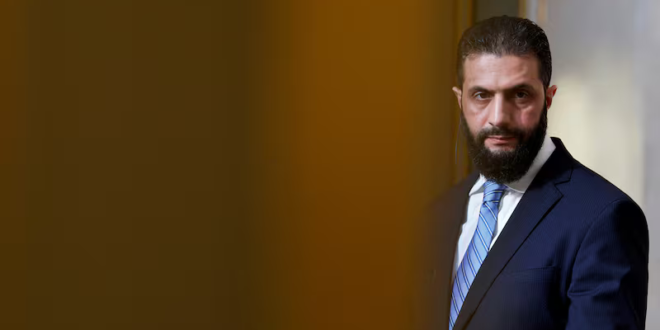Restrictions on HTS and Ahmad Al Shara are rooted in group’s deep ties to Al Qaeda and role in Syria’s civil war
The US is preparing to circulate to the UN Security Council a draft resolution calling for the lifting of sanctions on Syria’s leader Ahmad Al Shara.
Discussions are already under way between the Security Council’s permanent members – the US, France, UK, China and Russia – to potentially delist Mr Al Shara, his Minister of Interior Anas Khattab and Hayat Tahrir Al Sham (HTS), the group that forms the backbone of the Syrian government, as part of broader efforts to ease economic recovery, sources said.
A UN diplomat told The National that discussions will be “complicated” and require a targeted approach rather than a blanket lifting.
The diplomat also noted that China has expressed reservations, particularly over easing restrictions on certain groups, including foreign fighters.
Maya Ungar, a UN analyst at the International Crisis Group, told The National that Mr Al Shara was initially listed by France and the UK in 2014, while Interior Minister Anas Khattab was designated by the US and HTS was designated as an entity by Syria itself.
Any delisting would require consensus among the Security Council’s 15 members, some of which have previously opposed easing sanctions on Syrian groups.
UN sanctions on HTS and Mr Al Shara are rooted in the group’s deep ties to Al Qaeda and its role in the Syrian civil war.
“In January 2017, Nusra Front created Hayat Tahrir Al Sham as a vehicle to advance its position in the Syrian insurgency and further its own goals as Al Qaeda’s affiliate in Syria,” the UN sanctions list states.
HTS traces its origins to Jabhat Al Nusra, or the Nusra Front, which was Al Qaeda’s formal affiliate in Syria and was actively involved in planning, financing and executing attacks on behalf of the global network. In January 2017, Nusra Front rebranded itself as HTS, claiming it was separating from Al Qaeda to better position itself within Syria’s fractured insurgency.
Despite the rebranding, HTS remained under UN Security Council sanctions for its association with Al Qaeda and for “participating in the financing, planning, facilitating, preparing, or perpetrating” acts of terrorism.
“The UN sanctions on Al Shara, Khattab and HTS are strictly related to their involvement with Al Qaeda and ISIS, so discussions about lifting them should just be related to their break from these groups,” said Ms Ungar.
“However, the decision to delist is obviously political and focused on how to ensure that Syria is given a fighting chance to recover,” she added.
She noted that the recent suicide explosion at a church in the Syrian capital of Damascus is a “worrying indicator of potential future violence given challenges within the authorities ideological centre”.
No group has claimed responsibility, but Syrian authorities said it was carried out by an ISIS cell.
Ms Ungar said Mr Al Shara and his government have taken tangible steps towards fighting ISIS in Syria, including arresting and publicly executing some members.
Countries such as the US, she explained, have made it clear they are interested in engaging more with the authorities on counterterrorism.
“In order to do so, Al Shara must have the resources and authority to conduct counterterrorism operations,” said Ms Ungar.
The UN sanctions have frozen assets, blocked arms transfers, and imposed travel bans on Syrian leaders and HTS, complicating Syria’s engagement with foreign counterparts. However, there has been some flexibility: the council allowed Mr Al Shara to visit Saudi Arabia in February and Paris in May.
Mr Al Shara is also expected to attend the UN’s annual General Assembly gathering in New York in September.
 Eurasia Press & News
Eurasia Press & News




